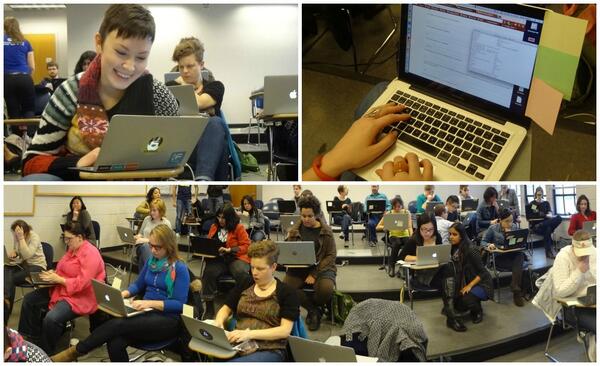I typically use LibreOffice Impress for my talks, much to some folks' surprise.
Yes, you
can make slides look okay with free software! But there's one
annoying caveat that has bothered me for ages.
Impress makes it nearly impossible to enter presenter mode with a single
display, while also displaying slides. I have never understood this limitation,
but it's existed for a minimum of
seven years.
I've tried all sorts of workarounds over the years, including
a macro that
forces LibreOffice into presenter mode, which I never was able to
figure out how to reverse once I ran it...
This has previously been an annoyance but never posed a big problem, because
when push came to shove I could leave my house and use an external monitor or
screen when presenting at meetups. But now, everything's virtual, I'm in
lockdown indefinitely, and I don't have another display available at home. And
about 8 hours before speaking at a meetup today, I realized I didn't have a way
to share my slides while seeing my speaker notes. Uh oh.
So I got this stupid idea.
...why don't I just placate LibreOffice with a FAKE display?
Virtual displays with
xrandr
My GPU had this capability innately, it turns out, if I could just whisper the
right incantations to unlock its secrets:
ehashman@red-dot:~$ cat /usr/share/X11/xorg.conf.d/20-intel.conf
Section "Device"
Identifier "intelgpu0"
Driver "intel"
Option "VirtualHeads" "1"
EndSection
After restarting X to allow this newly created config to take effect, I now
could see two new virtual displays available for use:
ehashman@red-dot:~$ xrandr
Screen 0: minimum 8 x 8, current 3840 x 1080, maximum 32767 x 32767
eDP1 connected primary 1920x1080+0+0 (normal left inverted right x axis y axis) 310mm x 170mm
1920x1080 60.01*+ 59.93
...
640x360 59.84 59.32 60.00
DP1 disconnected (normal left inverted right x axis y axis)
DP2 disconnected (normal left inverted right x axis y axis)
HDMI1 disconnected (normal left inverted right x axis y axis)
HDMI2 disconnected (normal left inverted right x axis y axis)
VIRTUAL1 disconnected (normal left inverted right x axis y axis)
VIRTUAL2 disconnected (normal left inverted right x axis y axis)
Nice. Now, to actually use it:
ehashman@red-dot:~$ xrandr --addmode VIRTUAL1 1920x1080
ehashman@red-dot:~$ xrandr --output VIRTUAL1 --mode 1920x1080 --right-of eDP1
And indeed, after running these commands, I found myself with a virtual
display, very happy to black hole all my windows, available to the imaginary
right of my laptop screen.
This allowed me to mash that "Present" button in LibreOffice and get my
presenter notes on my laptop display, while putting my actual slides in a
virtual time-out that I could still screenshare!
Wouldn't it be nice if LibreOffice just fixed the actual bug?
Well, actually...
I must forgive myself for my stage panic. The talk ended up going great, and
the immediate problem was solved. But it turns out this bug
has been
addressed upstream! It's just... not well-documented.
A couple years ago, there was
a forum post on ask.libreoffice.org that
featured this exact question, and a solution was provided!
Yes, use Open Expert Configuration via Tools > Options > LibreOffice >
Advanced. Search for StartAlways. You should get a node
org.openoffice.Office.PresenterScreen with line Presenter. Double-click that
line to toggle the boolean value to true.
I tested this out locally and... yeah that works. But it turns out the bug from
2013 had not been updated with this solution
until just a few months
ago.
There are very limited search results for this configuration property. I wish
this was much better documented. But so it goes with free software; here's a
hack and a real solution as we all try to improve things :)
 This is the report for the Debian Clojure Team remote sprint
that took place on May 13-14th.
Looking at my previous blog entries, this was my first Debian sprint since
July 2020! Crazy how fast time flies...
Many thanks to those who participated, namely:
This is the report for the Debian Clojure Team remote sprint
that took place on May 13-14th.
Looking at my previous blog entries, this was my first Debian sprint since
July 2020! Crazy how fast time flies...
Many thanks to those who participated, namely:



 Earlier this year, I helped plan and run the
Earlier this year, I helped plan and run the 